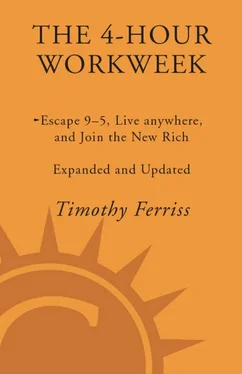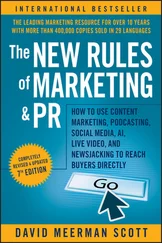Timothy Ferriss - The 4-Hour Workweek - Escape 9–5, Live Anywhere, and Join the New Rich - Expanded and Updated
Здесь есть возможность читать онлайн «Timothy Ferriss - The 4-Hour Workweek - Escape 9–5, Live Anywhere, and Join the New Rich - Expanded and Updated» весь текст электронной книги совершенно бесплатно (целиком полную версию без сокращений). В некоторых случаях можно слушать аудио, скачать через торрент в формате fb2 и присутствует краткое содержание. Жанр: Прочая научная литература, на английском языке. Описание произведения, (предисловие) а так же отзывы посетителей доступны на портале библиотеки ЛибКат.
- Название:The 4-Hour Workweek: Escape 9–5, Live Anywhere, and Join the New Rich - Expanded and Updated
- Автор:
- Жанр:
- Год:неизвестен
- ISBN:нет данных
- Рейтинг книги:3 / 5. Голосов: 1
-
Избранное:Добавить в избранное
- Отзывы:
-
Ваша оценка:
- 60
- 1
- 2
- 3
- 4
- 5
The 4-Hour Workweek: Escape 9–5, Live Anywhere, and Join the New Rich - Expanded and Updated: краткое содержание, описание и аннотация
Предлагаем к чтению аннотацию, описание, краткое содержание или предисловие (зависит от того, что написал сам автор книги «The 4-Hour Workweek: Escape 9–5, Live Anywhere, and Join the New Rich - Expanded and Updated»). Если вы не нашли необходимую информацию о книге — напишите в комментариях, мы постараемся отыскать её.
The 4-Hour Workweek: Escape 9–5, Live Anywhere, and Join the New Rich - Expanded and Updated — читать онлайн бесплатно полную книгу (весь текст) целиком
Ниже представлен текст книги, разбитый по страницам. Система сохранения места последней прочитанной страницы, позволяет с удобством читать онлайн бесплатно книгу «The 4-Hour Workweek: Escape 9–5, Live Anywhere, and Join the New Rich - Expanded and Updated», без необходимости каждый раз заново искать на чём Вы остановились. Поставьте закладку, и сможете в любой момент перейти на страницу, на которой закончили чтение.
Интервал:
Закладка:
I’m not saying don’t plan for the worst case—I have maxed out 401(k)s and IRAs I use primarily for tax purposes—but don’t mistake retirement for the goal.
2. Interest and Energy Are Cyclical.
If I offered you $10,000,000 to work 24 hours a day for 15 years and then retire, would you do it? Of course not—you couldn’t. It is unsustainable, just as what most define as a career: doing the same thing for 8+ hours per day until you break down or have enough cash to permanently stop.
How else can my 30-year-old friends all look like a cross between Donald Trump and Joan Rivers? It’s horrendous—premature aging fueled by triple bypass frappuccinos and impossible workloads.
Alternating periods of activity and rest is necessary to survive, let alone thrive. Capacity, interest, and mental endurance all wax and wane. Plan accordingly.
The NRaims to distribute “mini-retirements” throughout life instead of hoarding the recovery and enjoyment for the fool’s gold of retirement. By working only when you are most effective, life is both more productive and more enjoyable. It’s the perfect example of having your cake and eating it, too.
Personally, I now aim for one month of overseas relocation or high-intensity learning (tango, fighting, whatever) for every two months of work projects.
3. Less Is Not Laziness.
Doing less meaningless work, so that you can focus on things of greater personal importance, is NOT laziness. This is hard for most to accept, because our culture tends to reward personal sacrifice instead of personal productivity.
Few people choose to (or are able to) measure the results of their actions and thus measure their contribution in time. More time equals more self-worth and more reinforcement from those above and around them. The NR, despite fewer hours in the office, produce more meaningful results than the next dozen non- NRcombined.
Let’s define “laziness” anew—to endure a non-ideal existence, to let circumstance or others decide life for you, or to amass a fortune while passing through life like a spectator from an office window. The size of your bank account doesn’t change this, nor does the number of hours you log in handling unimportant e-mail or minutiae.
Focus on being productive instead of busy.
4. The Timing Is Never Right.
I once asked my mom how she decided when to have her first child, little ol’ me. The answer was simple: “It was something we wanted, and we decided there was no point in putting it off. The timing is never right to have a baby.” And so it is.
For all of the most important things, the timing always sucks. Waiting for a good time to quit your job? The stars will never align and the traffic lights of life will never all be green at the same time. The universe doesn’t conspire against you, but it doesn’t go out of its way to line up all the pins either. Conditions are never perfect. “Someday” is a disease that will take your dreams to the grave with you. Pro and con lists are just as bad. If it’s important to you and you want to do it “eventually,” just do it and correct course along the way.
5. Ask for Forgiveness, Not Permission.
If it isn’t going to devastate those around you, try it and then justify it. People—whether parents, partners, or bosses—deny things on an emotional basis that they can learn to accept after the fact. If the potential damage is moderate or in any way reversible, don’t give people the chance to say no. Most people are fast to stop you before you get started but hesitant to get in the way if you’re moving. Get good at being a troublemaker and saying sorry when you really screw up.
6. Emphasize Strengths, Don’t Fix Weaknesses.
Most people are good at a handful of things and utterly miserable at most. I am great at product creation and marketing but terrible at most of the things that follow.
My body is designed to lift heavy objects and throw them, and that’s it. I ignored this for a long time. I tried swimming and looked like a drowning monkey. I tried basketball and looked like a caveman. Then I became a fighter and took off.
It is far more lucrative and fun to leverage your strengths instead of attempting to fix all the chinks in your armor. The choice is between multiplication of results using strengths or incremental improvement fixing weaknesses that will, at best, become mediocre. Focus on better use of your best weapons instead of constant repair.
7. Things in Excess Become Their Opposite.
It is possible to have too much of a good thing. In excess, most endeavors and possessions take on the characteristics of their opposite. Thus:
Pacifists become militants.
Freedom fighters become tyrants.
Blessings become curses.
Help becomes hindrance. More becomes less. 4
Too much, too many, and too often of what you want becomes what you don’t want. This is true of possessions and even time. Lifestyle Design is thus not interested in creating an excess of idle time, which is poisonous, but the positive use of free time, defined simply as doing what you want as opposed to what you feel obligated to do.
8. Money Alone Is Not the Solution.
There is much to be said for the power of money as currency (I’m a fan myself), but adding more of it just isn’t the answer as often as we’d like to think. In part, it’s laziness. “If only I had more money” is the easiest way to postpone the intense self-examination and decision-making necessary to create a life of enjoyment—now and not later. By using money as the scapegoat and work as our all-consuming routine, we are able to conveniently disallow ourselves the time to do otherwise: “John, I’d love to talk about the gaping void I feel in my life, the hopelessness that hits me like a punch in the eye every time I start my computer in the morning, but I have so much work to do! I’ve got at least three hours of unimportant e-mail to reply to before calling the prospects who said ‘no’ yesterday. Gotta run!”
Busy yourself with the routine of the money wheel, pretend it’s the fix-all, and you artfully create a constant distraction that prevents you from seeing just how pointless it is. Deep down, you know it’s all an illusion, but with everyone participating in the same game of make-believe, it’s easy to forget.
The problem is more than money.
9. Relative Income Is More Important Than Absolute Income.
Among dietitians and nutritionists, there is some debate over the value of a calorie. Is a calorie a calorie, much like a rose is a rose? Is fat loss as simple as expending more calories than you consume, or is the source of those calories important? Based on work with top athletes, I know the answer to be the latter.
What about income? Is a dollar is a dollar is a dollar? The New Rich don’t think so.
Let’s look at this like a fifth-grade math problem. Two hardworking chaps are headed toward each other. Chap A moving at 80 hours per week and Chap B moving at 10 hours per week. They both make $50,000 per year. Who will be richer when they pass in the middle of the night? If you said B, you would be correct, and this is the difference between absoluteand relativeincome.
Absolute income is measured using one holy and inalterable variable: the raw and almighty dollar. Jane Doe makes $100,000 per year and is thus twice as rich as John Doe, who makes $50,000 per year.
Relative income uses two variables: the dollar and time, usually hours. The whole “per year” concept is arbitrary and makes it easy to trick yourself. Let’s look at the real trade. Jane Doe makes $100,000 per year, $2,000 for each of 50 weeks per year, and works 80 hours per week. Jane Doe thus makes $25 per hour. John Doe makes $50,000 per year, $1,000 for each of 50 weeks per year, but works 10 hours per week and hence makes $100 per hour. In relative income, John is four times richer.
Читать дальшеИнтервал:
Закладка:
Похожие книги на «The 4-Hour Workweek: Escape 9–5, Live Anywhere, and Join the New Rich - Expanded and Updated»
Представляем Вашему вниманию похожие книги на «The 4-Hour Workweek: Escape 9–5, Live Anywhere, and Join the New Rich - Expanded and Updated» списком для выбора. Мы отобрали схожую по названию и смыслу литературу в надежде предоставить читателям больше вариантов отыскать новые, интересные, ещё непрочитанные произведения.
Обсуждение, отзывы о книге «The 4-Hour Workweek: Escape 9–5, Live Anywhere, and Join the New Rich - Expanded and Updated» и просто собственные мнения читателей. Оставьте ваши комментарии, напишите, что Вы думаете о произведении, его смысле или главных героях. Укажите что конкретно понравилось, а что нет, и почему Вы так считаете.












